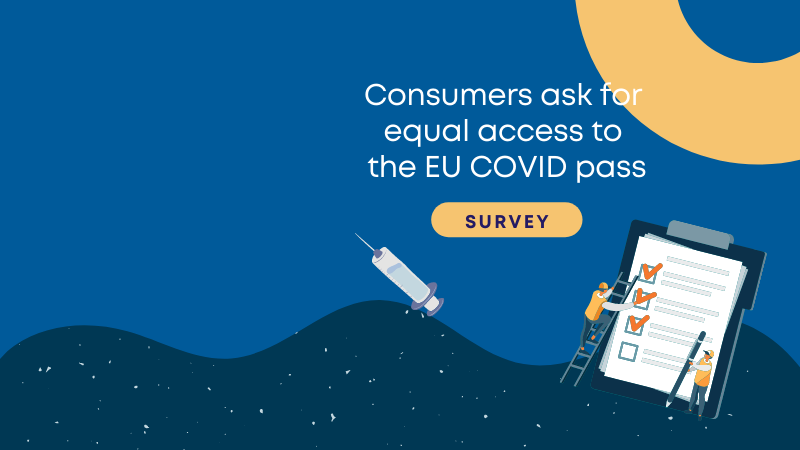This website uses cookies so that we can provide you with the best user experience possible. Cookie information is stored in your browser and performs functions such as recognising you when you return to our website and helping our team to understand which sections of the website you find most interesting and useful.
Euroconsumers’ 2nd survey on vaccination: citizens expect free of charge tests for the EU Digital Green Certificate

Euroconsumers’survey on attitudes towards COVID-19 vaccination and the EU COVID pass (vaccination passport) was carried out between 26th and 30th of March 2021. A representative group of 1000 adults aged between 18 to 74 years old was polled in each of the four countries of the survey. Another survey was previously carried out between
15th and 21st of January 2021.
Support for the European Commission’s COVID pass, but clear ask for free of charge tests to avoid discrimination
The European Commission has recently proposed to create a COVID pass (Digital Green Certificate) to facilitate the free movement of citizens within the EU this summer. The document would include one of three options: proof of COVID-19 vaccination, a negative test result, or having recovered from the virus. Euroconsumers’ survey shows that overall the COVID pass is well received since 59% agree the pass is a good measure to move freely within the EU again and 63% agree the pass will encourage vaccination.
However, a clear majority of respondents fear that the COVID pass might create discrimination between vaccinated and unvaccinated people. Two thirds of respondents (64%) also believe free of charge tests should be offered to those who did not have the opportunity to be vaccinated in order to get this pass. Almost half (44%) also feel EU Member States shouldn’t impose extra PRC tests or quarantine to vaccination passport holders.
The survey data supports Euroconsumers’ recent call on European authorities to turn the Digital Green Certificate into an effective tool that is used in a non-discriminatory, coordinated and proportionate way
A wide majority of EU citizens want to be vaccinated as soon as possible
Three quarters of respondents would be willing to be vaccinated next week if given the opportunity (51% would do it for sure and 28% probably). The proportion of the respondents who would do it without hesitation has increased in Belgium (+7%) and Portugal (+9%) since Euroconsumers’ January survey while Italy demonstrates an opposite trend (-8%) and there is almost a status quo in Spain (+1%).
Better information needed to ensure success of the vaccination campaign
Only one third of all respondents (36%) feel well informed about the COVID-19 vaccines, which is only up 3% since January. The better informed they feel the more willing to be vaccinated: among respondents stating they are (very) well informed, 65% would be surely willing to get a COVID-19 vaccine, while this is only the case for 32% of those indicating they are not or poorly informed.
This shows that, although some progress has been made, getting the right information through to the entire European population remains key to turn the COVID-19 vaccination campaign into a success and should therefore be a constant focus.
Reluctance towards vaccination due to fear of side effects and lack of trust in vaccines
Amongst the people not (fully) willing to get vaccinated, the main reason for this reluctance is by far the concern about possible side effects (55%) followed by not trusting certain COVID-19 vaccines (36%). Not belonging to a high-risk group comes up as 4th reason (26%) for hesitating about vaccination. The lack of trust in vaccines in general is the highest in Belgium (22% of those who are not sure to want to be vaccinated) and the lowest in in Portugal (5%).
Unsurprisingly the level of trust in the AstraZeneca vaccine is lower than for the other vaccines: 65% of those who are not vaccinated yet show some concern about the AstraZeneca vaccine compared with about one third for the other vaccines.
Find the press release here.


